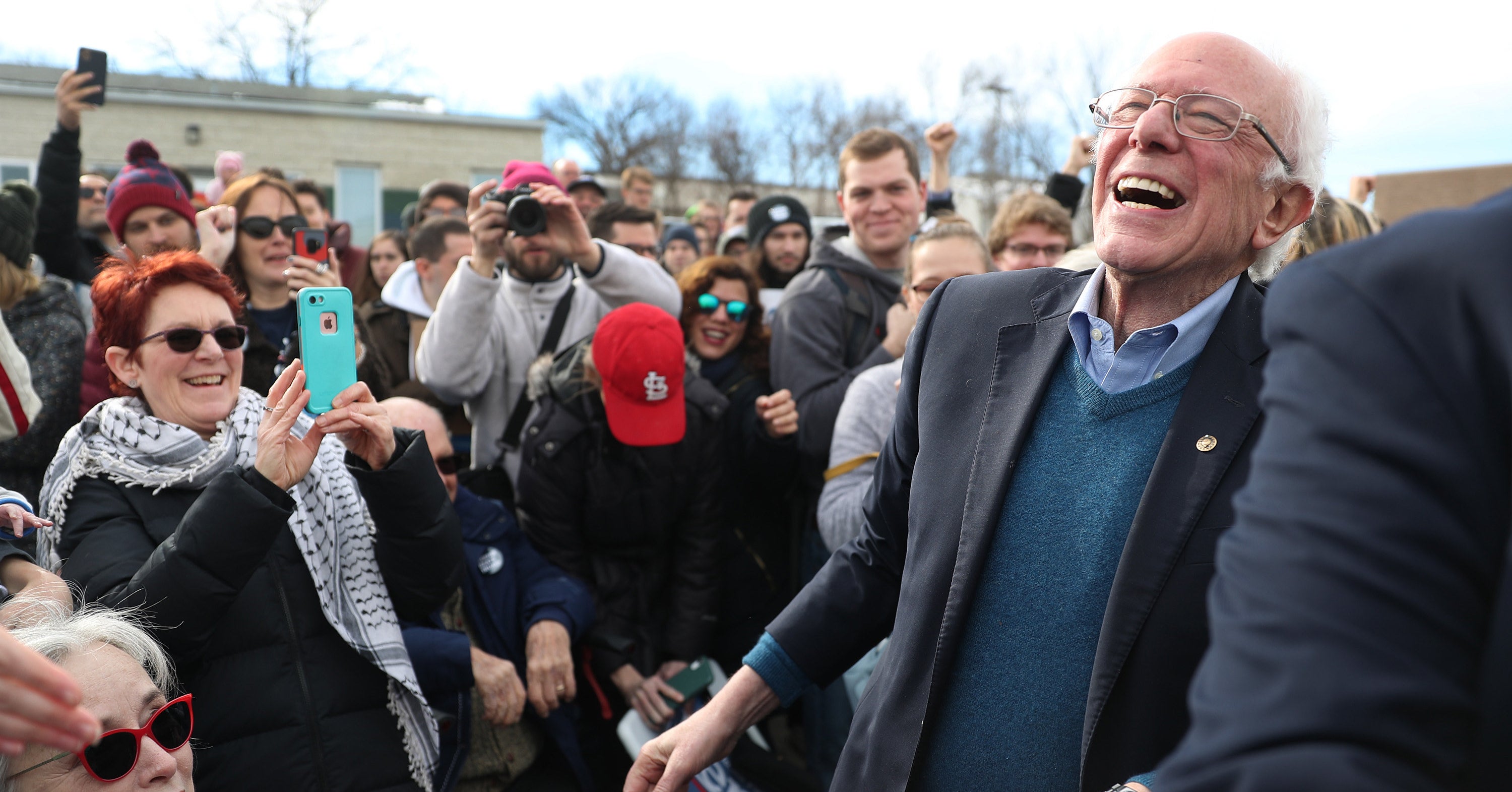
IOWA CITY, Iowa — Was he in a better mood than usual?
A campaign spokesperson, Mike Casca, shrugged: not particularly, no.
There were hints, at least, to the contrary. Maybe.
In Iowa City, after he cut in on his wife Jane’s speech at a coffee shop, the two wrestled flirtatiously over the microphone: “I’m gonna hear about this for years,” he said. In Cedar Rapids, he scanned the crowd outside a campaign’s field office, pointing with delight at seven supporters who had mounted a large pile of snow for a better view. “There’s even people up on the snow bank!” And in Grinnell, he conducted his own “scientific poll” of the crowd: “All those who think our campaign is the strongest to beat Trump, raise your hand...”
“Well,” he said, “based on a deep analysis and investigation of the American electorate, 98% of the people think we are the best. And I agree with that. I agree with that!”
But was he… “buoyant,” a reporter offered, mostly as a joke.
“Sure,” Casca said flatly.
Across the parking lot, flanked by piles of melting snow, the candidate stood hunched outside his Iowa City field office, yelling into the microphone about prescription drug prices and other familiar topics. There were a few references to breaking the state’s turnout records — “when we do that we’re gonna win,” he told a crowd on Sunday morning — but he did not revel in his position at the top of the polls or indulge in nostalgia about the end of his Iowa campaign.
“He’s focused,” Casca said.
Though he’s always focused.
“He’s focused on tomorrow,” Casca clarified.
Tomorrow would be Monday, the day of the Iowa caucuses. At the age of 78 — four years after coming close here in his first presidential campaign, four months after a heart attack almost threatened to end his second — Bernie Sanders could be on the verge of a remarkable personal and professional vindication. But if the weight of the moment was setting in, he did not show it.
Sanders, the longtime Vermont independent, is not particularly emotive. He doesn’t dedicate much time to reflection or introspection, and when he does, he certainly doesn’t discuss it.
“The senator is even-keel all the time,” said Nina Turner, the former Ohio state senator who serves as Sanders’s campaign co-chair and close adviser. “He doesn’t have ups and downs.”
On Sunday, his last day of campaigning in Iowa, likely ever, he carried on as per usual, visiting three field offices across the state before returning to briefly address supporters at a bar in Des Moines. “Tomorrow night is the beginning,” Sanders told a gathering at Ingersoll Tap, speaking for just about five minutes before leaving to catch a flight to Washington, where he is scheduled to attend impeachment proceedings in the Senate.
Afterward, supporters and staff milled around the bar, watching the Super Bowl.
“Is Bernie coming back?” one woman asked.
Four years ago, on the eve of the 2016 caucuses, Sanders tempered expectations about voter turnout, saying the record-breaking levels from the 2008 Democratic primary would likely “stay in the history books." At his stops at field offices on Sunday — in one rare sign of the candidate’s hopes for Monday — he told supporters he hoped to drive the “largest voter turnout in the history of the Iowa caucus.”
“Basically the message is that we cannot simply complain about the status quo,” Sanders said. “We can’t complain about Trump. We can’t complain about low wages. We can’t complain about education. We can’t complain about climate change or the high cost of prescription drugs. Now is the time to end the complaining. Now is the time for action. Action is tomorrow night.”
There’s palpable panic elsewhere about a potential Sanders win.
John Kerry, one of the top advocates of a Joe Biden presidency, was overheard by an NBC reporter in a Des Moines hotel suggesting he may join the race himself to try and stop Sanders. Kerry later called the suggestion that he was considering running “fucking (or categorically) false.”
Hillary Clinton has also been revisiting her own frustrations with Sanders, saying in a podcast interview this week that he and his campaign did not do enough to unite the Democratic Party after their bitter 2016 contest. And those comments came after she said in a new documentary, and stood by in an interview, that “nobody” likes Sanders.
His longtime chief strategist, Jeff Weaver, explained Sanders' mindset as a “function of running against the establishment.”
“I’ve been with Bernie for 35 years,” Weaver said. “I was going to rooms with him in 1986 when there were five people coming to see him. If you can believe the polls, it looks like he will do very well tomorrow, but it’d be the same if he were behind.”
“There are always forces against you. That’s his mindset.”
On Sunday, at his last stop before returning to Des Moines, Sanders was at a campaign field office in Newton. “This is actually the last canvass organizer event that we have done in this campaign,” he remarked. Before leaving, he bent down to leave a note on a white board for his volunteers.
“Thanks for all your hard work!” he wrote.
"how" - Google News
February 03, 2020 at 08:05AM
https://ift.tt/37SZ3RW
He Might Win Iowa. But Don’t Ask Bernie Sanders How He’s Feeling. - BuzzFeed News
"how" - Google News
https://ift.tt/2MfXd3I
Bagikan Berita Ini














0 Response to "He Might Win Iowa. But Don’t Ask Bernie Sanders How He’s Feeling. - BuzzFeed News"
Post a Comment